Understanding Jealousy and Envy Causes, Consequences, Treatment, and Coping Strategies
It was a beautiful day at the coffee shop. The sun was shining, and the smell of fresh coffee wafted through the air. Emma was sitting at her favorite table, enjoying a latte and a croissant when she received a call from Samantha.

“Hi, Emma,” Samantha said, her voice dripping with fake sweetness. “I heard you’re starting a new business. How exciting for you!”
Emma knew what Samantha was up to. She had always been jealous of her success and was probably trying to spy on her again.
But Emma had a plan this time. She had hired a new employee and instructed them to feed Samantha false information. She knew Samantha would fall for hook, line, and sinker.
“Oh, it’s nothing too exciting, Samantha,” Emma replied, trying to keep the smirk out of her voice. “Just a small coffee shop. Nothing like your big corporation.”
Samantha’s eyes lit up at the mention of a coffee shop. She had always wanted to expand into the coffee market and saw this as an opportunity to get ahead.
“Well, Emma, I would love to hear more about your coffee shop. So let’s meet up and discuss it in person.
“Of course, Samantha,” Emma replied, her mind already working on a plan. “Why don’t we meet up tomorrow at the coffee shop? I’ll give you a tour to discuss the business.”
Samantha eagerly agreed and hung up the phone. Emma couldn’t help but laugh to herself. But, of course, Samantha had no idea what was coming.
The next day, Samantha arrived at the coffee shop dressed in her finest suit and carrying a notepad. Emma greeted her with a smile and a hug, and they began the tour.
As they walked around, Emma pointed out all of the latest equipment and the unique features of the coffee shop. She mentioned the high costs of everything, hoping to deter Samantha from trying to compete.
But Samantha was not deterred. She saw this as an opportunity to take over the coffee market and was already making plans in her head.
As they sat down to discuss the business, Samantha asked detailed questions about the coffee shop’s finances, suppliers, and marketing strategies. Emma smiled, knowing that Samantha was falling right into her trap.
“Well, Samantha, I have to be honest with you,” Emma said, looking her straight in the eye. “We’re not a coffee shop. We’re a front for a secret government agency and use the coffee shop as a cover.”
Samantha’s eyes widened in shock. She couldn’t believe what she was hearing.
“But don’t worry,” Emma continued. “We’ve got everything under control. Unfortunately, we had to feed you false information to throw you off our trail.”
Samantha was speechless. She couldn’t believe she had again fallen for Emma’s trick.
As she left the coffee shop, humiliated and defeated, Samantha realized that her jealousy and competitiveness had blinded her to the truth. She had been so focused on bringing others down that she had missed the beauty of her own life.
From that day on, Samantha vowed to change her ways. She realized that true success comes from within and that she didn’t need to spy on others to get ahead. Instead, she focused on her business and worked hard to make it the best possible.
And although she never quite reached the level of success Emma did, she was happy knowing that she had found the path that was honest and true to herself. As for Emma, she continued running her coffee shop, knowing she had outsmarted Samantha once again.
1. Introduction
Jealousy is a highly intricate emotion encompassing insecurity, fear, and concern. It may stem from a person’s low self-esteem or negative self-image and is often characterized by feelings of unhappiness and anger triggered by the belief that a loved one may be unfaithful or a desire to possess what someone else has. Jealousy is a persistent emotion that can occupy a person’s mind throughout the day.
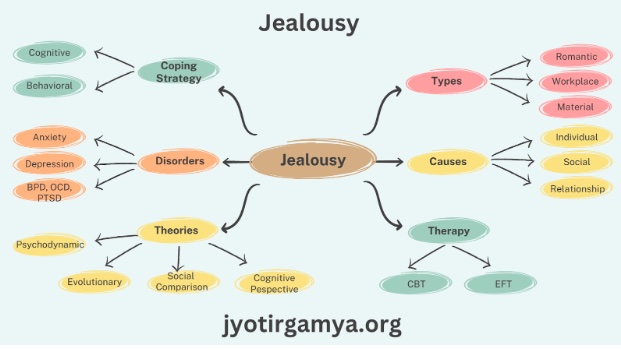
Research suggests that the average human has about 6200 thoughts daily, and approximately 70 to 80 percent are unfavorable. This is a significant cause for concern.
While experiencing jealousy is common among humans, the problem arises when these thoughts trigger an emotional reaction. Extreme jealousy can significantly impact a person’s daily life, creating a cycle of negative thoughts and emotions that can be difficult to break free from. In addition, envy creates fear in individuals that someone may take away something that belongs to them or that they consider theirs.
Jealousy is typically associated with fear, anger, and resentment that arises when a person perceives a threat to a valued relationship or possession. Conversely, envy is often characterized by feelings of inferiority, covetousness, and discontent that arise when someone desires something that someone else possesses.
2. Definition of Jealousy and Envy
Jealousy and envy are two of the most common negative emotions experienced by individuals across the globe. According to psychologists, jealousy is an emotional response that occurs when an individual perceives a threat to an existing relationship or a valued possession. For example, a person may feel jealous when they perceive their romantic partner to be attracted to someone else.
Envy, conversely, is characterized by feelings of discontent, longing, and covetousness that arise when a person desires something that someone else possesses. For example, someone may envy their friend’s success, wealth, or material possessions.
While jealousy and envy are often used interchangeably, they are distinct emotions that differ in focus. Jealousy is typically focused on a particular relationship or possession, while envy is concentrated on a certain quality or control that someone else has.
3. Importance of Studying the Psychology of Jealousy and Envy
The psychology of jealousy and envy is vital because these emotions can significantly affect an individual’s mental health and well-being. For example, experiencing jealousy and envy can lead to increased stress, anxiety, and depression, negatively impacting an individual’s overall quality of life.
Additionally, jealousy and envy can have detrimental effects on interpersonal relationships. Jealousy, in particular, can lead to mistrust, resentment, and conflict in romantic relationships, while envy can lead to feelings of bitterness, competitiveness, and social isolation.
By understanding the psychology of jealousy and envy, psychologists and mental health professionals can develop effective interventions and treatments to help individuals cope with these challenging emotional states. This includes developing cognitive-behavioral strategies to help individuals identify and challenge negative thought patterns and developing mindfulness-based interventions to help individuals regulate their emotions.
4. Theories on Jealousy and Envy
Jealousy and envy are complex emotional states that psychologists have studied for decades. Understanding the theories behind these emotions is essential in developing effective interventions and treatments to help individuals cope with these challenging emotional states. This section will explore four theories of jealousy and envy evolutionary theory, social comparison theory, cognitive perspective, and psychodynamic theory.
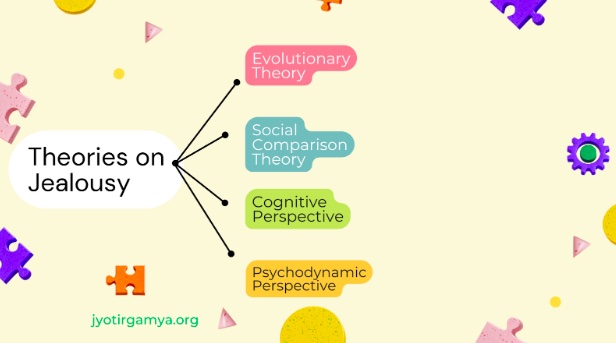
Evolutionary Theory
Evolutionary theory suggests that jealousy and envy have evolved as adaptive responses to reproductive and social challenges. According to this theory, jealousy protects one’s romantic relationship from threats such as infidelity, while envy motivates individuals to strive for social status and resources.
Studies have shown that men tend to experience more jealousy in response to sexual infidelity, while women tend to experience more jealousy in response to an emotional affair. Additionally, envy is often directed towards individuals who possess qualities or resources seen as valuable in the social environment.
Social Comparison Theory
Social comparison theory suggests that individuals evaluate their abilities and qualities by comparing themselves. When individuals perceive themselves to be inferior to others in some way, they may experience envy. In contrast, when individuals perceive themselves as superior to others, they may share feelings of superiority.
Research has shown that envy is most likely to occur when individuals are similar, and the desired quality or resource is considered scarce or difficult to obtain.
Cognitive Perspective
The cognitive perspective on jealousy and envy focuses on the mental processes that underlie these emotional states. According to this theory, jealousy and envy arise when individuals perceive a threat to a valued relationship or possession. The individual then performs cognitive appraisals of the situation, such as evaluating the level of danger and the likelihood of harm.
Research has shown that cognitive factors such as rumination, negative attribution style, and maladaptive beliefs can contribute to the experience of jealousy and envy.
Psychodynamic Perspective
The psychodynamic perspective on jealousy and envy emphasizes the role of unconscious processes in the experience of these emotions. According to this theory, jealousy and envy arise from unconscious conflicts related to early childhood experiences, mainly attachment and object relations.
Psychodynamic therapists may use techniques such as free association, dream analysis, and transference interpretation to help individuals gain insight into these unconscious processes and resolve conflicts related to jealousy and envy.
5. Types of Jealousy
Jealousy and envy are complex emotions that have different variations and intensities. Here are the different types of jealousy and envy
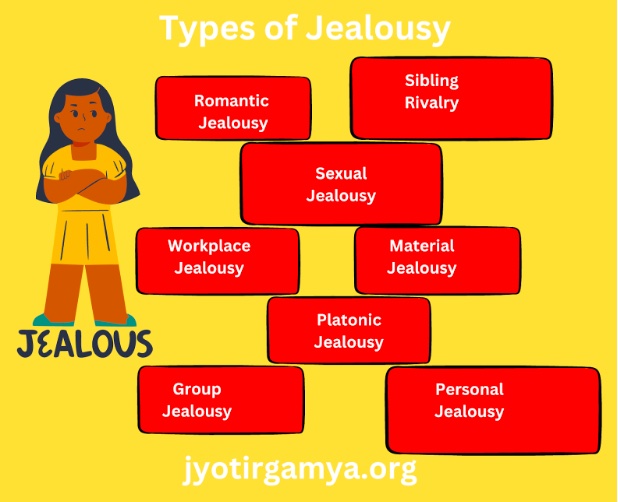
Romantic jealousy
This type of jealousy is specific to romantic relationships. It is triggered when a partner perceives a threat to the relationship, such as when the other partner spends time with someone else or shows interest in another person.
Sexual jealousy
It is a subtype of romantic jealousy, which is triggered when a partner perceives a threat to the sexual aspect of the relationship. For example, when a partner suspects the other partner is having sexual relations with someone else.
Sibling rivalry
This sibling jealousy is often fueled by competition for parental attention, resources, or privileges. However, sibling rivalry can also develop from differences in personality or abilities.
Workplace jealousy
This type of jealousy occurs in the workplace and is triggered by feelings of competition, perceived favoritism, or a colleague’s success. Workplace jealousy can affect job satisfaction, productivity, and interpersonal relationships.
Platonic jealousy
Platonic jealousy occurs in non-romantic relationships and is triggered by the fear of losing the attention or affection of a friend, family member, or colleague.
Material jealousy
The desire for material possessions or financial success triggers this type of jealousy. In addition, material jealousy can lead to feelings of inferiority or resentment towards those who possess more wealth or material possessions.
Personal jealousy
This type of jealousy is a general feeling of envy towards someone’s personal qualities or achievements, such as intelligence, appearance, or talent.
Group jealousy
Group jealousy is triggered by feeling left out or excluded from a group, social circle, or community.
It’s important to note that jealousy and envy can overlap and coexist, and an individual may experience multiple types of jealousy or envy simultaneously. Furthermore, the intensity and expression of these emotions can also vary widely among individuals, making it a complex and dynamic phenomenon to study.
6. Cognitive and Emotional Aspects of Jealousy and Envy
Jealousy and envy are often used interchangeably, but they are distinct emotional states with different cognitive and emotional aspects, motivations, and behaviors. In this section, we will explore the differences between jealousy and envy.
Difference Between Jealousy and Envy
Jealousy and envy also differ in their cognitive and emotional aspects. For example, jealousy is typically associated with a cognitive appraisal of a threat to a valued relationship or possession. In contrast, envy is associated with comparing oneself and others. In addition, jealousy is often accompanied by anger, fear, and anxiety, while envy is often accompanied by resentment, bitterness, and dissatisfaction.
Differences in Motivation and Behavior
Jealousy and envy also differ in their motivation and behavior. Jealousy is typically motivated by a desire to protect a valued relationship or possession, while envy is inspired by a desire to obtain something another person has. Jealousy may lead to monitoring, possessiveness, and aggression, while envy may lead to behaviors such as social comparison, striving, and achievement.
For example, a person jealous of their partner may engage in behaviors such as monitoring their partner’s activities, restricting their partner’s social interactions, or engaging in verbal or physical aggression towards their partner. In contrast, a person envious of someone else’s success may engage in behaviors such as seeking to outdo the other person, working harder to achieve similar success, or being resentful and bitter towards the other person.
7. Causes of jealousy and envy
Jealousy and envy are complex emotional states arising from various individual, social, and relationship factors. In this section, we will explore the causes of jealousy and envy and how they manifest in different contexts.
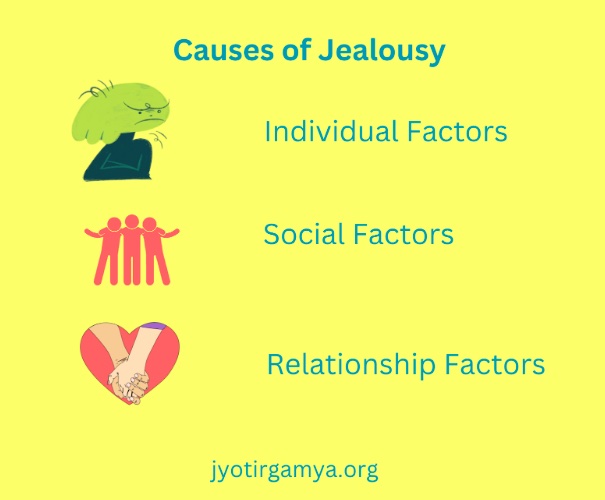
Individual Factors
Personality traits such as low self-esteem, neuroticism, and emotional instability can make individuals more susceptible to jealousy and envy. Individuals with these traits are more likely to perceive threats to their self-worth and relationships. They may be more likely to experience intense emotional reactions to perceived slights or rejections.
Social Factors
Cultural norms and social comparison can also contribute to feelings of jealousy and envy. For example, envy may be more prevalent in cultures emphasizing competition and individual achievement. Additionally, social media and the internet have made it easier for individuals to compare themselves to others, leading to increased feelings of envy and jealousy.
Relationship Factors
Jealousy and envy often arise in romantic relationships, where perceived threats to the relationship can trigger feelings of fear, anger, and anxiety. Attachment style can also play a role in jealousy and envy, with individuals with an anxious attachment style being more prone to jealousy and individuals with an avoidant attachment style being more prone to envy.
8. Mental Health Issues Related to Jealousy and Envy
Jealousy is a natural human emotion that everyone experiences at some point. However, when jealousy becomes excessive, it can lead to mental health issues.
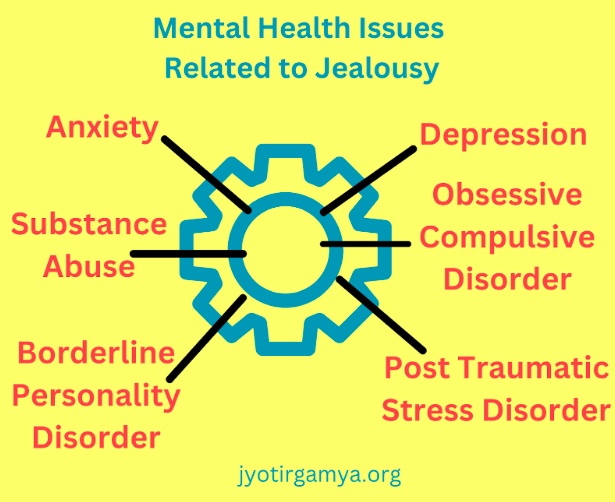
Anxiety disorders
Jealousy can trigger anxiety disorders, such as generalized and social anxiety disorders. People who experience excessive jealousy may constantly worry about losing their partner or friends, and they may avoid social situations to prevent feeling jealous. Anxiety disorders can lead to physical symptoms such as sweating, trembling, and heart palpitations.
Depression
Jealousy can also lead to depression, especially if an individual cannot manage jealousy effectively. When someone feels jealous, they may question their worth and feel inferior. This can lead to feelings of sadness, hopelessness, and worthlessness, which are common symptoms of depression.
Obsessive-compulsive disorder
Obsessive-compulsive disorder (OCD) is an anxiety disorder characterized by obsessive and repetitive thoughts or behaviors. For example, people with OCD may experience intrusive thoughts about their partner cheating on them or engage in repetitive behaviors such as constantly checking their partner’s phone or social media accounts due to jealousy.
Borderline personality disorder
Borderline personality disorder (BPD) is a mental health disorder characterized by intense and unstable emotions, impulsivity, and a distorted self-image. In addition, people with BPD may experience extreme jealousy in their relationships, leading to emotional dysregulation and relationship problems.
Post-traumatic stress disorder
Jealousy can also trigger post-traumatic stress disorder (PTSD), especially if an individual has experienced infidelity or betrayal in past relationships. People with PTSD may share intrusive thoughts, flashbacks, and nightmares related to the traumatic event, which jealousy can trigger.
Substance abuse
Jealousy can also lead to substance abuse to cope with the emotional distress it causes. People who experience jealousy may turn to alcohol, drugs, or other substances to numb their feelings or to self-medicate. Substance abuse can seriously affect an individual’s physical and mental health.
Excessive jealousy can have a significant impact on an individual’s mental health. It can trigger anxiety disorders, depression, OCD, BPD, PTSD, and substance abuse. Therefore, it is essential to manage jealousy effectively to prevent it from becoming a mental health issue. Seeking professional help from a therapist or counselor can be beneficial in managing jealousy and its associated mental health issues.
9. Common Physical Symptoms of Jealousy
Jealousy can cause a range of physical and psychological symptoms, depending on the intensity and duration of the emotion. In this article, we will explore some common physical symptoms of jealousy.
Increased heart rate and blood pressure When experiencing jealousy, the body’s fight-or-flight response is activated, increasing heart rate and blood pressure. This physical response is similar to the body’s reaction to stress and can cause anxiety and tension.
Sweating and increased body temperature
Jealousy can also cause sweating and an increase in body temperature. This physical response relates to the body’s attempt to cool itself down during the fight-or-flight response.
Tension in muscles and body aches
Jealousy can also cause muscle tension, leading to body aches and pain. This physical symptom is related to the body’s response to stress, as muscles become tense when the body is preparing to fight or flee.
Stomach problems such as nausea or butterflies
Jealousy can also cause stomach problems, such as nausea or butterflies. This physical response relates to the body’s sympathetic nervous system activation, which can affect digestion and cause gastrointestinal issues.
Breathing difficulties or hyperventilation
Jealousy can also cause breathing difficulties or hyperventilation. This physical symptom is related to the body’s response to stress, as breathing becomes shallow and rapid when the body is preparing to fight or flee.
Insomnia and trouble sleeping Jealousy can also cause insomnia and difficulty sleeping. Again, this physical symptom relates to the body’s response to stress, as the fight-or-flight response can disrupt standard sleep patterns.
10. The Role of the Brain in Physical Symptoms of Jealousy
Jealousy is a complex emotion that can cause various physical and psychological symptoms. In recent years, researchers have begun to examine the role of the brain in producing these symptoms. The brain is a critical player in the experience of jealousy, and several specific regions and hormones have been identified as being involved.
The amygdala is a critical region of the brain that is activated during experiences of jealousy. The amygdala processes emotions and triggers the body’s fight-or-flight response. When someone experiences jealousy, the amygdala activates and produces a cascade of physical and psychological symptoms.
Another critical factor in the experience of jealousy is the stress response. Feelings of anxiety and stress often accompany jealousy, and these emotions can have a significant impact on the body. When the brain perceives a threat, it activates the body’s stress response system, which releases hormones such as cortisol and adrenaline. These hormones can cause physical symptoms such as increased heart rate, sweating, and muscle tension.
Research has also shown that jealousy can impact brain function over time. For example, chronic jealousy has been linked to changes in brain structure and function, including alterations in the prefrontal cortex, which is responsible for decision-making and impulse control.
Overall, the role of the brain in the physical symptoms of jealousy is complex and multifaceted. Therefore, further research is needed to fully understand the neurobiological mechanisms underlying this emotion. However, current findings suggest that the brain plays a crucial role in producing the physical symptoms of jealousy and that understanding this role can help individuals better cope with and manage this emotion.
11. Consequences of jealousy and envy
Jealousy and envy can negatively affect individuals, relationships, and mental health. The emotional consequences of jealousy and envy include anger, sadness, anxiety, and frustration. These emotions can often lead to negative behaviors, such as aggression, avoidance, and self-sabotage, further perpetuating these negative feelings. The behavioral consequences of jealousy and envy can also significantly impact relationships, leading to trust issues and communication problems that can ultimately result in a breakup.
In addition to emotional and behavioral consequences, jealousy and envy can also impact mental health. Individuals who experience jealousy and envy may be more likely to experience symptoms of depression, anxiety, and low self-esteem. Furthermore, jealousy and envy can exacerbate mental health conditions like a borderline personality disorder.
Jealousy and envy are often linked to social comparison, which can lead to further negative consequences. The social comparison refers to evaluating oneself about others, and jealousy and envy can arise when individuals perceive themselves as inferior. Social media platforms, where individuals can easily compare themselves to others, can exacerbate these feelings.
It is also essential to consider cultural differences in the expression of jealousy and envy. For example, some cultures may view jealousy as a normal and acceptable emotion, while others may view it as a sign of weakness or lack of trust. These cultural differences can impact how individuals experience and express jealousy and envy.
Overall, it is essential to understand the consequences of jealousy and envy to manage and overcome these emotions effectively. Through therapy, self-reflection, and communication, individuals can work towards reducing the negative impact of jealousy and envy on their lives and relationships.
12. Coping with jealousy and envy
While jealousy and envy are natural emotions, they can become problematic when they lead to negative behaviors or interfere with relationships. Effective management strategies include recognizing and accepting feelings, communicating openly and honestly, developing self-awareness and emotional regulation skills, and seeking professional help.
Let us explore coping strategies to manage jealousy and envy and their effects on productivity and motivation.
Cognitive strategies
Cognitive strategies involve changing the way we think about a situation. They include reframing the situation positively, practicing gratitude, and cognitive restructuring. Reframing involves changing how we view a problem, focusing on the positives rather than the negative aspects. Cognitive restructuring involves challenging negative thoughts and replacing them with more positive ones.
Behavioral strategies
Behavioral strategies involve changing our actions to manage jealousy and envy. Examples of behavioral strategies include self-improvement, such as developing new skills or hobbies, and communication, such as constructively expressing feelings. Self-improvement can help boost self-esteem and confidence, reducing feelings of envy and jealousy. Likewise, communication can help resolve conflicts and misunderstandings, reducing jealousy and improving relationships.
Relationship strategies
Relationship strategies involve building and maintaining healthy relationships to manage jealousy and envy. Examples of relationship strategies include trust-building and couple therapy. Trust-building involves honesty, reliability, and consistency, which can help build trust in relationships. Couple therapy can provide a safe and supportive environment to explore and address issues related to jealousy and envy.
How to cope with jealousy and envy in romantic relationships
In romantic relationships, jealousy, and envy can lead to conflict and mistrust. Coping strategies can include practicing self-awareness, building trust, and communicating effectively. Practicing self-awareness involves understanding and acknowledging our feelings and behaviors related to jealousy and envy. Building trust involves being open, honest, and reliable in the relationship. Finally, effective communication involves constructively expressing feelings and listening actively to our partner’s perspective.
How to spot and address jealousy and envy in yourself and others
Recognizing jealousy and envy in ourselves and others can help us address these emotions before they escalate. Signs of jealousy and envy include feeling insecure, comparing oneself to others, and resentful towards others' successes. Coping strategies include practicing self-awareness, using cognitive and behavioral techniques, and seeking professional help.
The effects of jealousy and envy on productivity and motivation
Jealousy and envy can adversely affect productivity and motivation, both individually and in the workplace. These emotions can decrease self-esteem, job satisfaction, and inspiration to achieve goals. Coping strategies can include developing a growth mindset, focusing on personal goals rather than comparisons, and seeking support from colleagues and mentors.
13. Therapy for Jealousy
Therapy can be a practical approach to addressing jealousy and its associated negative consequences. Various types of therapy can help handle jealousy, including individual, couple, and group therapy. The choice of therapy depends on the individual’s needs and preferences, the severity of the issue, and the impact of jealousy on their relationships.
Evidence-Based Therapies
Jealousy’s most effective treatment options are evidence-based therapies, such as cognitive-behavioral therapy (CBT) and emotion-focused therapy (EFT). CBT addresses irrational beliefs and thought patterns that lead to envy, while EFT emphasizes emotional awareness, expression, and regulation.
Therapeutic Techniques
Several therapeutic techniques can be used to address jealousy in relationships. One such technique is role-playing, where individuals can practice communicating their feelings, needs, and boundaries in a safe and controlled environment. Psychoeducation is another technique to help individuals develop a deeper understanding of jealousy and its triggers and learn coping strategies.
14. Conclusion
Jealousy and envy are complex and multifaceted emotions that can significantly affect individuals, relationships, and society. This article explored various aspects of jealousy and envy, including their definitions, theories, differences, causes, consequences, coping strategies, and practical implications.
One of the key takeaways from this article is that jealousy and envy are not inherently negative emotions but rather natural responses to social comparison and perceived threats to one’s well-being or self-esteem. However, when these emotions become chronic or intense, they can lead to negative consequences, such as emotional distress, relationship problems, and poor productivity.
Theoretical perspectives, such as evolutionary theory, social comparison theory, cognitive perspective, and psychodynamic perspective, have provided valuable insights into jealousy and envy’s underlying mechanisms and processes. Additionally, research has identified individual, social, and relationship factors contributing to jealousy and envy and cognitive and behavioral strategies that can help individuals cope with these emotions.
It is important to continue investigating jealousy and envy in various contexts, such as personal achievement and success, workplace dynamics, and social media. Additionally, practical interventions and strategies can be developed to help individuals and society better manage jealousy and envy constructively.
In conclusion, studying jealousy and envy is crucial for understanding human behavior and relationships and promoting psychological well-being and social harmony. Acknowledging and addressing jealousy and envy in ourselves and others can cultivate healthier and more fulfilling lives and relationships.
15. Author Credits
Bharat Sehrawat has laid the foundation for this article. Bharat is a highly educated and experienced Rehabilitation Counsellor (RCI). He has a strong background in counseling psychology and psychotherapy, with a deep understanding of hypnotherapy and NLP.
Bharat is pursuing his Doctor of Philosophy (Ph.D.) in Psychology from Om Sterling Global University Hissar. He is a committed and dedicated professional passionate about helping others through his work as a Rehabilitation Counsellor.
Frequently Asked Questions on Jealousy and Envy
Jealousy arises when you fear losing something valuable, like a relationship, to a rival. Envy, on the other hand, is when you desire something that someone else has, like their success or possessions. Jealousy involves a triad (you, another person, and a rival), while envy involves only you and another person.
Jealousy and envy can lead to increased stress, anxiety, and depression. These emotions can cause feelings of worthlessness, frustration, and resentment. Over time, they can damage self-esteem and lead to chronic mental health issues if not managed properly.
Effective coping strategies include: Practicing gratitude, improving self-awareness, open communication, building trust, and seeking professional help. Therapists can provide strategies to manage intense feelings of jealousy.
Social media can amplify jealousy and envy by showcasing idealized versions of others' lives. Seeing friends' achievements, travels, and relationships can make you feel inadequate or left out, leading to constant comparisons and heightened feelings of envy and jealousy.
Jealousy can be positive if it motivates you to improve yourself or your relationships. For example, feeling jealous of a colleague's success might push you to work harder and achieve your goals. In relationships, addressing jealousy can lead to better communication and stronger bonds.
Essential Reads on Jealousy
Journaling Prompts to Overcome Workplace Jealousy
Eleven Cures to Workplace Jealousy
Five Easy Ways to Manage Jealousy
If you like what we are doing, do spread the word.
Want to stay connected? Here’s our twitter.
Or subscribe to our monthly newsletter containing tools for body, mind, and goal.